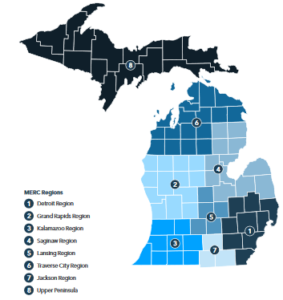Legislative Update 7-31-20
Whitmer tightens social, entertainment restrictions as caseloads climb
 Gov. Gretchen Whitmer tightened restrictions on social and entertainment activity in Northern Michigan today in response to rising caseloads of COVID-19 in Michigan.
Gov. Gretchen Whitmer tightened restrictions on social and entertainment activity in Northern Michigan today in response to rising caseloads of COVID-19 in Michigan.
Beginning July 31, Executive Orders 160 and 161 direct that:
Bars that rely on alcohol sales for 70 percent or more of revenue are closed to indoor service.
Indoor gatherings are limited to no more than 10 people (in Regions 6 & 8, the limits are 25% of max capacity or 250 people, whichever is smaller).
These changes apply statewide, including to Regions 6 and 8 (the Upper Peninsula and 17 counties in the Northern Lower Peninsula), which have been operating with fewer restrictions for several weeks. The changes bring those regions into alignment with rules imposed on other regions in the southern parts of Michigan.
The executive orders consolidate and update a variety of existing executive orders, and it does expand activities in one area: the three casinos in the city of Detroit can reopen, but only to 15 percent of capacity.
Below is a summary of current executive orders on key county functions
Open Meeting Act
- Virtual sessions allowed (EO 154)
- Indoor gatherings limited to 10 people (EO 160, except for Regions 6 & 8)
- In Regions 6 & 8, 25% of max capacity or 250 people, whichever is smaller
Freedom of Information Act
- Normal operations resumed in June (EO 112)
Courts
- Normal filing deadlines resumed in June
Nonessential workers
- Any work capable of being performed remotely must be performed remotely; however, office work may be performed provided work done in conformance with COVID-19 protections provided in EO 161
DHHS: Opioid overdoses surge during COVID-19 pandemic
 “Emergency Medical Services (EMS) and emergency departments (EDs) in Michigan have both seen substantial increases in opioid overdoses since the beginning of the COVID-19 epidemic,” the Michigan Department of Health and Human Services said in a release this week.
“Emergency Medical Services (EMS) and emergency departments (EDs) in Michigan have both seen substantial increases in opioid overdoses since the beginning of the COVID-19 epidemic,” the Michigan Department of Health and Human Services said in a release this week.
According to statistics gathered by MDHHS, EMS responses for opioid overdose increased by 33 percent from April to May of this year. Additionally, EMS responses for opioid overdoses from April through June 2020 were 26 percent higher than the same period in 2019. EMS responses for opioid overdoses increased for all regions and nearly all demographic groups.
The data provides other insights on how the pandemic has impacted the opioid crisis, DHHS noted. Patients were more likely to refuse transport to EDs in April to June compared to the same period in 2019. The percentage of opioid overdose EMS responses that resulted in the patient declining transport to EDs nearly doubled from 7.7 percent April to June 2019 to 14.3 percent April to June 2020.
After an initial drop in April, ED visits for opioid overdoses increased in May and June to pre-pandemic levels despite EDs seeing fewer visits overall in Michigan during the pandemic. The total number of ED visits April to June 2020 declined 38 percent compared with April to June 2019, while the number of opioid overdose ED visits increased by 2 percent. It is too early to determine if opioid overdose deaths have increased following the onset of the pandemic due to the length of time required to finalize death certificates.
Also this week, Judge Patricia Perez Fresard of the Wayne County Circuit Court heard arguments from the defendants’ motion to dismiss the state’s claims against drug distributors, including Cardinal Health Inc., McKesson Corp., AmerisourceBergen Drug Corp. and Walgreens.
“Among other defenses raised, defendants denied having a duty to prevent illegal diversion of opioids, and further claims d they are insulated from liability under Michigan’s Product Liability Act. Contrary to defendants claims, the State argued that defendants do have the duty and responsibility to ensure that these highly addictive medications are not diverted into illegal distribution and further that the Product Liability Act, which provides a defense to a defective product claim when a drug is FDA approved, does not protect defendants from responsibility for their illegal distribution and exacerbation of the opioids epidemic.”
For more information about overdoses and resources for prevention and treatment, visit Michigan.gov/Opioids.
One week left to register for the 2020 Virtual Annual Conference
 Legendary Michigan State University coach Tom Izzo will address attendees of the 2020 Virtual Annual Conference LIVE on Aug. 20 at 11 a.m.. After his remarks on leadership and team building, the national championship coach will take questions.
Legendary Michigan State University coach Tom Izzo will address attendees of the 2020 Virtual Annual Conference LIVE on Aug. 20 at 11 a.m.. After his remarks on leadership and team building, the national championship coach will take questions.- Plenary sessions that will feature MAC’s Legislative Update, the semi-annual “State of MAC” report and an address by MAC Board President Veronica Klinefelt
- The Annual Business Meeting, during which members will vote on MAC’s policy platforms for the 2020-21 year
- Seven policy workshops that will focus heavily on the implications of COVID-19 for counties in the coming months
- A Virtual Exhibitor Show that will allow attendees to select up to five firms from which to hear 10-minute presentations
- The conference registration fee is only $50 for members, which includes all county officials
- Attendees must register by a new deadline prior to the event – Aug. 7
- MAC will not accept “walk-up” registrations during the conference (this is due to credentialing and election procedures adopted for the conference)
Treasury sets Aug. 18 webinar on pension, OPEB planning
 On Aug. 18, the Michigan Department of Treasury will host a webinar event to assist local governments in the management and sustainability of their pension and retiree health care (OPEB) systems. This webinar, which will run from 2 p.m. to 3:15 p.m., provides additional resources in response to ever-changing economic conditions.
On Aug. 18, the Michigan Department of Treasury will host a webinar event to assist local governments in the management and sustainability of their pension and retiree health care (OPEB) systems. This webinar, which will run from 2 p.m. to 3:15 p.m., provides additional resources in response to ever-changing economic conditions.
Topics will include updates from the Municipal Employees Retirement System (MERS) and the Michigan Association of Public Employees Retirement Systems (MAPERS) on local pension and health care systems, problem solving and management of legacy debt from MSU Extension, University of Michigan, and the Citizens Research Council, and an update regarding reporting data, waiver applications, and the corrective action process for Public Act 202 of 2017 from the Department of Treasury.
Participants can register on the webinar’s registration page. Questions may be submitted during registration or sent to LocalRetirementReporting@michigan.gov by Friday, Aug. 14.
The event will be hosted using Microsoft Teams Live. A link to the webinar will be provided upon registration. Upon registration, instructions on how to use Microsoft Teams will also be provided. A recorded copy of this webinar and the PowerPoint will be made available after the webinar is completed on www.Michigan.gov/CEFD.
Additionally, the Michigan Department of Treasury has developed a webpage with numbered letters, memorandums, webinars, and resources regarding COVID-19 updates for local governments and school districts. This webpage was created to ensure that Michigan communities have access to the most up-to-date guidance and is updated frequently with information and resources as they become available.
 Staff picks
Staff picks
- Opioid abuse surges in Michigan amid misery of coronavirus (Bridge Magazine)
- In Michigan, closing the digital divide can unite the red and the blue (Brookings Institution)
- Legislative Watch: Homelessness in the COVID era (Governing Magazine)
- Lockdowns could be the ‘biggest conservation action’ in a century (The Atlantic Magazine)







